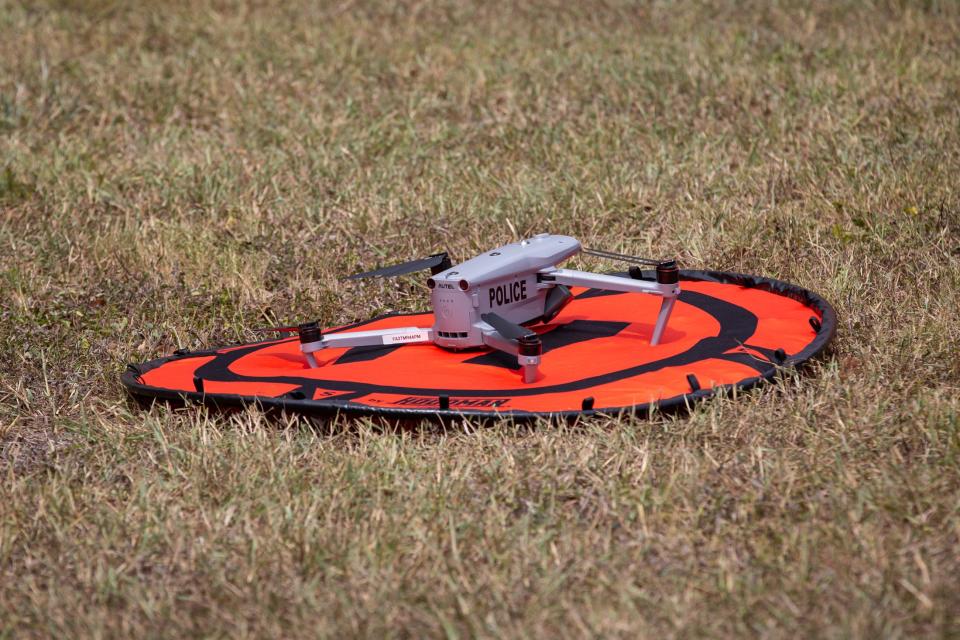Louisville Metro Police to expand drone program. Here's how it will work
- Oops!Something went wrong.Please try again later.
Louisville Metro Police will expand its use of drones for “intelligence gathering” and responding to incidents, city officials said at a press conference on Thursday morning.
Under a pilot program, each of LMPD’s eight divisions will be receiving a drone and training for up to four officers.
The move, Louisville Mayor Craig Greenberg said, was spurred by Metro Council members lobbying for more to be done to confront people “who are illegally using dirt bikes and ATVs in our public spaces, in areas that those are not permitted, that are causing danger to others, that are impeding beneficial use of parks.”
Councilwoman Cindi Fowler, who represents District 14 in southwest Jefferson County, said improper use of dirt bikes and ATVs has been “a real problem in my district. I have lost three constituents in my district to this activity.”
While that issue sparked conversations about an expanded drone program, Greenberg said drones will also be used in other ways, like helping officers prepare to deploy to emergency situations, helping officers respond faster to individuals hurt in accidents or violent crime and to “better identify people who are in the process of breaking the law and putting others in danger in public spaces.”
Maj. Donald Boeckman, who leads the department’s 3rd Division, said the drone use is “not a surveillance type thing. It’s more of an intelligence gathering thing.”
According to the Electronic Freedom Foundation — a digital rights nonprofit — nearly 1,500 law enforcement agencies across the country use drones.
Police departments elsewhere have pointed to drone first responder programs as a way to cope with staffing shortages like the one LMPD is experiencing.

Advocates of police drones have also pointed to the ability to reduce potentially dangerous police interactions with the public by sending officers to a scene only when a police response is actually needed.
However, the rapidly expanding use of drones by law enforcement in recent years has drawn concern from civil liberties groups like the American Civil Liberties Union, which says there needs to be “strict limits” regarding when they are used and how data they collect is handled.
“Good policies, including on usage limits, transparency and privacy, should not be left up to police departments, but should be given legal force by a city council or other legislative body as part of a vote to approve” police use of drones as first responders, ACLU senior policy analyst Jay Stanley wrote last year.
Chief among the concerns of civil liberties advocates is the specter of law enforcement drones being used to conduct warrantless surveillance.
LMPD Chief Jacquelyn Gwinn-Villaroel said LMPD has had a drone program in operation “for a while” and that Thursday’s announcement is only an expansion of the program to all divisions.
Later on Thursday, an LMPD spokesperson told The Courier Journal LMPD launched its first drone flight on Dec. 27, 2021, and has since logged 340 flights. However, many of those flights were during the same incidents or events, they said, with a new flight logged every time a new battery was changed.
Currently, LMPD has seven drones and four pilots operating across Louisville, the spokesperson said. They added that drones are currently used for "situational awareness during active incidents, traffic monitoring during special events, photos of large crime scenes [and] accident reconstruction."
In 2020, LMPD told Louisville Public Media the agency partnered with Kentucky State Police to monitor protests that year with drones because LMPD did not have drones of its own.
LMPD’s drone policy, contained within the agency's 922-page-long Standard Operating Procedures, was originally created in November 2021.
The policy says drone use is authorized in a number of situations, including documenting crime scenes, search-and-rescue operations, special event overwatch, barricaded subjects and “any other incidents approved by the Chief of Police, or his/her designee.”
According to the policy, drones “will not be used for the purpose of investigative surveillance” and pilots “will make every effort not to record locations and persons that are not the subject of the mission. This is an effort to protect the individual privacy of members of the public who are not involved in the incident.”
Chula Vista, California’s police department pioneered the use of drones as first responders. That department publicly releases maps of drone flight paths online along with information such as the address to which they were dispatched, the reasons they were sent and the case number.
Checking that police department’s drone-tracking website on Thursday morning, The Courier Journal was able to see numerous drone flights from the previous afternoon, including flights responding to calls about mental health crises, a person with a weapon and a traffic accident.
Asked if Louisville will commit to releasing that same data, Gwinn-Villaroel said LMPD will publicly release that information, but will “develop our own timeline” to release it.
Greenberg said the drone pilot program will cost $100,000 for training in addition to the cost of the drones.
Reach reporter Josh Wood at jwood@courier-journal.com or on X, formerly known as Twitter, at @JWoodJourno
This article originally appeared on Louisville Courier Journal: Louisville Metro Police Department expanding drone program

